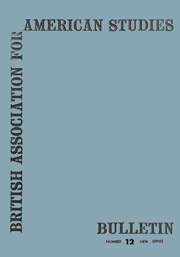Article contents
The Conditions of Isolationism
Published online by Cambridge University Press: 17 February 2011
Extract
Recent work on American foreign policy between the two world wars has shown some dissatisfaction with the term “isolationism” as a tool for the historian. The immediate reasons for this dissatisfaction are two. First, it is remarkably difficult to identify an individual statesman firmly as an isolationist or an interventionist. Lodge, Hughes, Kellogg, Hoover, Stimson, Roosevelt, Hull – the list could be extended – all move embarrassingly from positions which can be called isolationist to others which seem to strain the term past recognition; nor are these shifts in one direction only. Second, a specific policy which can be identified as isolationist is often justified by remarkably various arguments, so that support for the policy makes some curious allies, while dividing men from others with whom they seem, in general, to have far more in common. If the term can be used neither to identify a man throughout his career, nor to identify a group of attitudes, a cast of political mind, its usefulness is certainly diminished
- Type
- Research Article
- Information
- Copyright
- Copyright © British Association for American Studies 1964
References
- 1
- Cited by


